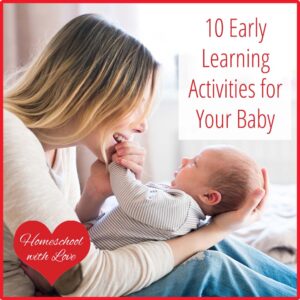
You don’t have to wait until your child turns 4 or 5 to begin homeschooling!
You can start while your child is an infant by doing simple early learning activities that will help him develop his cognitive abilities. These activities will help him grow physically, mentally, and socially. Development in these areas will prepare him for learning more formal subjects later in life.
Below is a list of 10 early learning activities that are easy to implement in your homeschool. Your baby will be able to do some of these activities by himself but will require supervision. Others will require some interaction with you. All are enjoyable activities that will help your baby develop in important ways.
10 Early Learning Activities for Babies
- Talk to your baby. Tell him what you are doing throughout the day. Ask him questions while he plays. Let him hear different inflections in your voice. This is how he learns language.
- Listen to your baby. When your baby “speaks” to you with coos and babbles, listen to him. Make eye contact. Respond by talking back to him. This is how he learns social interactions.
- Name objects. Tell your baby the names of objects. While you set the table, you can carry him on your hip and tell him the names of the dishes and silverware you put out. When shopping, you can name the items you put in the cart. This helps to reinforce speech development in your infant.
- Make faces at your baby. Show him a happy face, an excited face, a surprised face, etc. You can even mention each emotion as you make the face. This helps him tie words to feelings.
- Read aloud. From an early age you can instill a love of books in your child by reading aloud to him. Choose very short board books or soft baby books to begin with. Read only as long as your baby is interested.
- Play music. Music can influence a baby’s emotions just as it does yours. Lullabies can soothe. Marches can excite. Children’s songs can bring joy. It also serves as a good auditory stimulus for your baby.
- Do simple fingerplays. Songs and chants like “This Little Piggy,” “Pat-a-Cake,” and “The Itzy Bitzy Spider” are some examples of simple fingerplays you can do with your infant. These are beneficial for developing motor skills.
- Provide good learning toys. These don’t have to be fancy. In fact, some of the classic toys like rattles, baby blocks, and stackers are good learning toys.
- Let your baby draw in whipping cream. You can put colored whipping cream on a high chair tray for your infant to draw on. This is good for developing eye-hand coordination.
- Provide sensory activities. Babies learn through touch. That’s why it’s a good idea to provide them with a variety of safe objects that have different textures and shapes. Sensory bins are also useful for providing babies with tactile stimulation as well as the learning toys I mentioned previously.
Remember that for babies, play is learning. So give your infant ample time to play throughout the day.
One word of caution: Be careful not to do too many early learning activities with your baby. This can cause him to be overstimulated. If your infant starts to act irritated by what you’re doing together, take a break.
Bookmark or pin this post so you can find it again.







